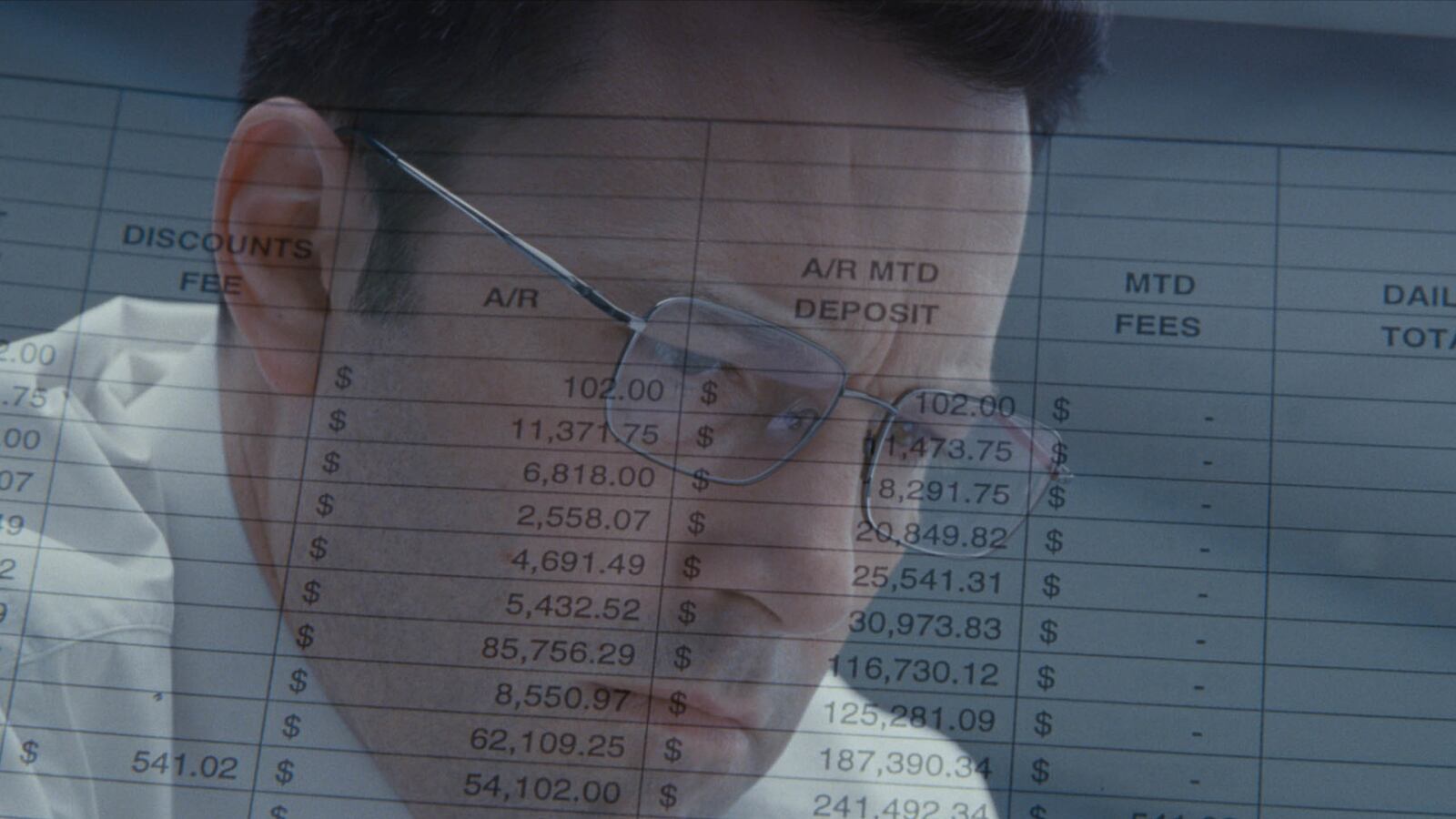In the nearly unclassifiable thriller The Accountant, Ben Affleck trades the Bat-armor for another crime-fighting costume: spectacles, a sensible suit, and a pocket protector. By day he crunches tax returns for folks out of his strip-mall office in the suburbs. On the side, we swiftly learn in this audaciously serious genre romp, he’s a stone-cold killer with numbers—or a sniper rifle, or a knife, or his bare hands, or even the belt he wears looped through his sensible slacks. Affleck’s titular accountant, you might say, is a CPA with a very particular set of skills.
There’s as much Taken as there is Rain Man to be found in The Accountant, a frequently frustrating but surprisingly entertaining genre mishmash that’s at least upfront about its central conceit: Ben Affleck is definitely, 100 percent going for it as Hollywood’s first autistic assassin. That’s not enough to make it a good movie, exactly, but it certainly keeps The Accountant watchable in drips and drops of eccentric, fleeting brilliance, in a truly weird kind of dad thriller that never met an accounting joke it didn’t like.
Directed by Warrior helmer Gavin O’Connor from a Black List screenplay by Bill Dubuque (The Judge), The Accountant has such a daring high-concept premise, it’s a shame how far it is from being cohesive. Affleck stars as Christian Wolff, a quiet and tidy loner whose high-functioning autism makes him a natural at the accounting arts—particularly when his shady cartel and crime-lord clients need him to sift through impossible amounts of files and figures to piece together the puzzle when cash goes missing.
A lifetime of brutal hand-to-hand combat and weapons training also makes him the easy choice when those messy books need resolving. His Yelp rating, one imagines, must be impeccable. Affleck’s Wolff is nothing if not efficient at his job, slicing and shooting his way through entire buildings of bad guys with the same cool precision he uses to solve complex mathematical equations. In The Accountant, Affleck’s targets are granted no mercy, only enough swift and deadly retribution to settle the score. No Marthas can save these men. The only mistake we ever hear of him making, quite literally, is that he filed his taxes properly and on time.
The mystery of Wolff’s identity unspools throughout the film’s opening act as gritty U.S Treasury Director Ray King (J.K. Simmons) ropes reluctant analyst Marybeth Medina (Cynthia Addai-Robinson) into hunting him down through the only breadcrumbs he has: photographs of an unidentified man in a suit and the nagging suspicion that he’s the key to something big. Meanwhile, Wolff’s taken his latest gig tracking $61 million that’s gone missing from the ledgers of a major cybernetic robotics manufacturer run by Lamar Black (John Lithgow).
But just as Wolff starts to math his way toward figuring out the culprit, executives start dying and his project is cut short, wreaking hell on his ability to cope with the chaos. Normally he’d lock himself in the dark and beat his shins with a wooden dowel while listening to metal, as you do. (If you’re looking for any deep understanding of how folks on the spectrum really live, you won’t find it here.) Instead, this time, he goes on the run with Dana (a charmingly chatty Anna Kendrick), the junior numbers-cruncher also privy to the fiscal breach, setting a collision course with a shadowy-but-flashy assassin (Jon Bernthal) and the feds hot on his trail.
Once The Accountant’s plot gets going, it dazzles with bullet-flying action and winking humor. One of its most enjoyable moments boils down to a simple wave of the hand—a tiny throwaway gesture that manages to be the best-timed punchline in the entire movie. Other highlights come when Affleck’s reclusive Wolff begrudgingly lets his guard down with the spunky Dana, and shares with her his most sacred space: a 34-foot Airstream trailer filled with priceless art and all his getaway cash, his superspy drawer of passports and faux identities next to a meticulously placed Star Wars lightsaber.
All the while, unfortunately, we’re yanked out of the present to flash back to Wolff’s past. Some fathers teach their boys to throw a schoolyard punch. Recognizing his son’s disorder would mark him as different, Wolff’s Army vet single dad subjected him to years of brutal martial-arts training so he’d become a fighter, not a victim. It’s a provocative idea and one whose sincerity is underscored by the X-Men-style school for children with developmental disorders that plays a key role in the plot. One in 68 children in America are diagnosed as on the spectrum, the film lectures its captive audience. We should teach those children it’s what makes them different that makes them special—even if that lesson is autistic kids can grow up to be stone-cold assassins, too.
Admirably enough, O’Connor doesn’t seem to care that his head-spinning mélange of genres and tones is bound to try the patience of his audience. It is what it is: a hit man drama-thriller-mystery that champions autism as a form of underappreciated superheroism. The flaws don’t negate that bold raison d’etre, even if The Accountant suffers from too many of them. For one, it has more characters than it can handle. It veers between droning exposition, bone-crunching action, too many flashbacks, and brief moments of romance and humor. And its dogged insistence on trumpeting itself as a form of R-rated hyperviolent autism advocacy is uncharted cinematic territory, to say the least.

It’s really more like The Bourne Identity meets A Beautiful Mind—so much so that Affleck even gets to furrow his brow and concentrate real hard through a montage scribbling figures on the windows and doors of an office, just like John Nash. Tragically, the last thing the already flat Affleck needs is to play a humorless rock of a character who struggles to convey and read emotional cues. You can see Affleck plainly trying to give his high-functioning hero a sense of authenticity, but it mostly comes off as unintentionally wooden when he’s not applying his laser focus on crushing his enemies to death. Affleck’s an actor best suited to more outwardly emotional douchebag roles that tap into his innate bro-iness. But his painfully disciplined Wolff speaks in a stilted soft-spoken hush, and puffs methodically at his hands before doing anything—whether it’s eating dinner or performing an audit. But Affleck struggles to convey how viscerally discomfited the guy is by most social settings and how longingly he would love to feel the human connections that elude him. It’s not a good look for him since he manages to muster only a few variations on the same stoic gaze through two hours and change onscreen.
And yet the times he actually does hit a self-aware groove, the strangest studio movie of the year—inclusive crime thriller, advocacy actioner, the only film you’ll ever see that big-ups both 19th-century German mathematician Carl Gauss and Dogs Playing Poker with equal reverence—begs even more of Affleck’s autistic action hero. I did not expect to miss his awkward guy shtick on screen when he wasn’t on it, but that very unlikely event happened during one heinously interminable scene of third-act exposition. O’Connor’s niftiest trick is that he manages to pull The Accountant back from the brink at least long enough to make a case for seeing more of Affleck’s Accountant in future sequels. He reaches his full potential while scrapping his way through a climactic scene set inside a sprawling luxury home under siege, finding emotional catharsis in the middle of a gunfight. Jason Bourne might have been able to do that, too, but could he also get you money back on your tax return?





